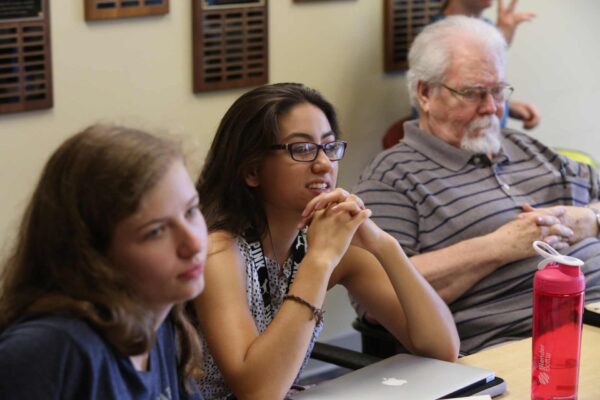
Philosophy
Values and Society
Why Major in Philosophy at Allegheny College
Philosophy inquires into structures that form the basis of all that exists, the ways we can justify our claims to knowledge, and the values and goals that guide individuals and societies.
Unusual Combinations
Students often combine Philosophy with:
Division
- Values and Society
Program Type
- Major
- Minor
Number of Credits
42 for major24 for minorWhere Philosophy Alumni Work Today
Contemporary Craft Arts
Cheteyan Scholar ’23
Editorial Director
Teach for America
Teacher ‘22
Common Roots
Americorps VISTA ‘21
University of Pittsburgh
Academic Administrator ‘20
Global Policy Institute
Equal Rights Amendment Project ‘20
Columbia Law School
Equal Rights Amendment Project ‘19
Professors at Allegheny are highly trained in utilizing the complexity of the philosophical tradition to develop tools for personal development and career interests. Young adults must learn skills which empower them to lead their own lives.
Your Four-Year Journey
Year 1: Understanding
Majors begin with an introduction to classic texts, analysis of argument, the study of knowledge, or ethics and social criticism.
Year 2: New Approaches
200-level focus courses may be selected by entering students: Knowledge and understanding – The Theory of Knowledge, Scientific understanding – Science in its Cultural Setting, and Mind and Brain, Social philosophy – Oppression and Liberation, and Business and Professional Ethics
Year 3: Delving Deeper
Advanced studies are arranged as seminar discussions. Courses include: Global Justice, Freedom, Addiction and the Opioid Crisis, Medical Ethics. The Philosophy Seminar is completed in the junior or senior year of study, a topical analysis for all majors that features our most advanced work.
Year 4: The Comp
The Senior Comp is a tutorial arrangement, an individualized course of study that develops a student’s original thesis with the research guidance of a faculty member over two semesters. Individualized programs of study may be approached in consultation with a faculty member.
Faculty and Staff
Email: epalmer@allegheny.edu
Phone: 814-332-3312
Email: ikurtsal@allegheny.edu
Phone: 814-332-3311
Featured News

Two Allegheny Graduates Provide Data-Driven Solutions To Leaders At Penta Group
No matter where alumni end up, other Allegheny College graduates aren’t too far away. In the case of Tim Kloeppel ’15 and Nicholas Dias ’17, it happened to be the same company.










